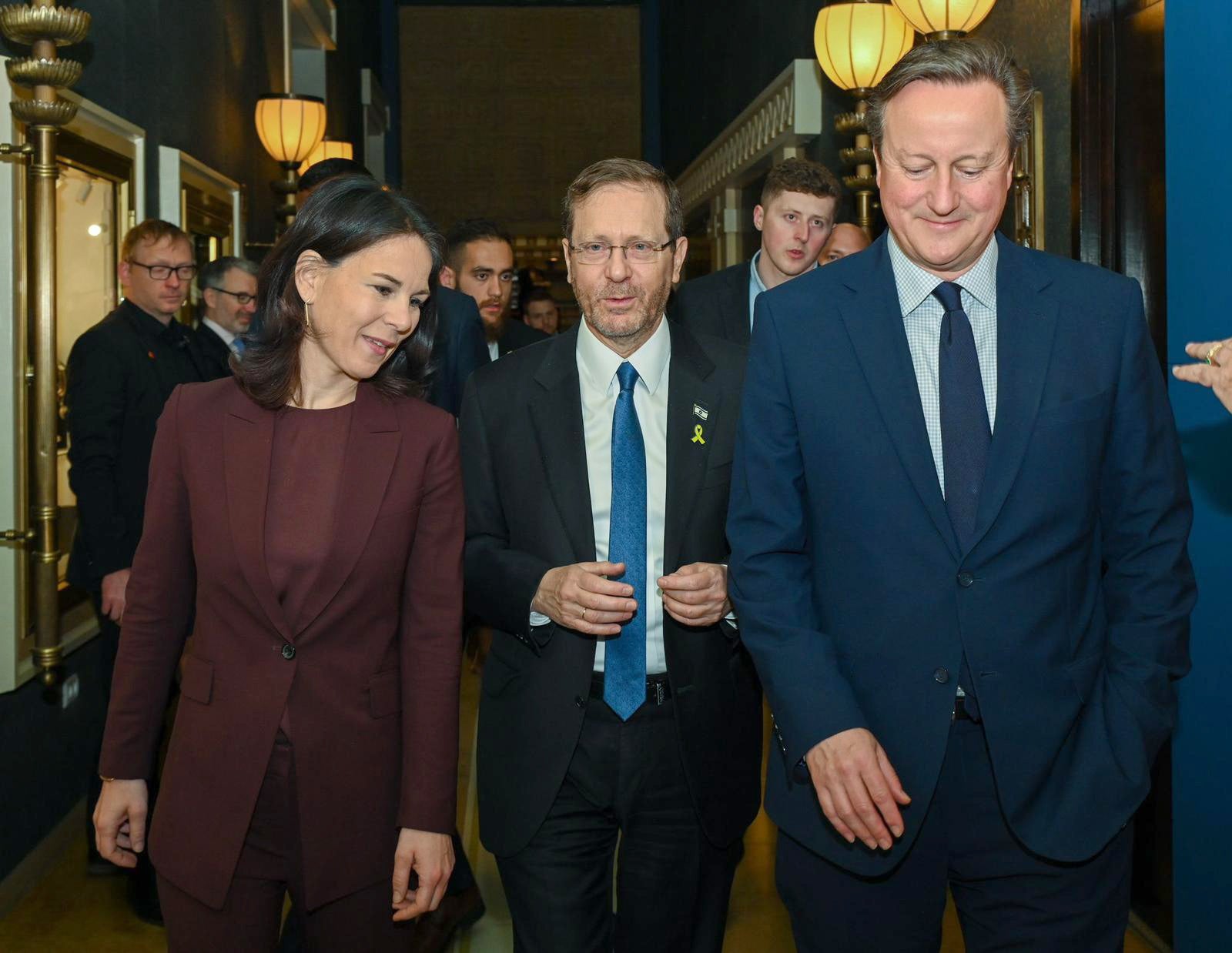Netanyahu rejects Cameron’s call for restraint in Iran attack response – saying Israel will make own decision
Israeli prime minister says he thanks allies for their ‘suggestions and advice’
Benjamin Netanyahu has rebuffed calls for restraint in Israel’s response to Iran’s drone and missile attack over the weekend – despite a direct appeal from David Cameron during talks in Jerusalem.
In a pointed statement, the Israeli prime minister’s office thanked both Lord Cameron and Germany’s foreign minister, Annalena Baerbock, for their “suggestions and advice” while telling them: “I want to make it clear – we will make our own decisions, and the State of Israel will do everything necessary to defend itself.”
Earlier, the foreign secretary said that Israel is “making the decision to act” in retaliation against Iran, but called on Mr Netanyahu’s government to respond in a way that will do “as little to escalate” the confrontation between the two bitter adversaries as possible to avoid wider war in the Middle East.
The UK and US have led calls for restraint in retaliation and Rishi Sunak delivered a similar message to Mr Netanyahu in a phone call, saying it was “time for calm heads to prevail”. Lord Cameron travelled to Israel late on Tuesday to discuss its response to Tehran’s barrage.
Lord Cameron, who also met with Israeli president Isaac Herzog on Wednesday, said: “It is right to have made our views clear about what should happen next, but it is clear the Israelis are making the decision to act.
“We hope they do so in a way that does as little to escalate this as possible and in a way that, as I said yesterday, is smart as well as tough,” he added.

But speaking later at a cabinet meeting, Mr Netanyahu said: “I have just come from meeting with the British and German foreign ministers … I thank our friends for their support in defence of Israel and I say this — support in both words and deeds. They also have all kinds of suggestions and advice, which I appreciate; however, I would also like to clarify — we will make our decisions ourselves.”
Iranian president Ebrahim Raisi warned that the “tiniest” attack by Israel on Iranian soil would bring a “massive and harsh” response during an appearance at the National Army Day parade in Tehran. At the same event, Iranian army chief Major General Abdolrahim Mousavi said that any aggression against Iran’s interests will be met with a “firm and regret-inducing response”.
Meanwhile, Zohar Palti, a former director of intelligence of Mossad, the Israeli spy agency, told Sky News that targeting nuclear facilities in Iran is among the options on the table for Israel.
Lord Cameron is due to head from Israel to a meeting of G7 foreign ministers in Italy. The foreign secretary said he hoped the meeting would result in more “coordinated sanctions” against Iran, saying a “clear and unequivocal message” had to be sent to Tehran.
Israel has demanded sanctions from 32 countries, including the UK, on Iran’s missile programme, with Tehran possessing thousands of missiles.
The UK has already sanctioned several Iranians along with the Iranian Revolutionary Guard Corps (IRGC). But ministers have rejected calls from MPs to proscribe the IRGC as a terrorist organisation, warning it jeopardise Britain's ability to engage diplomatically with Iran.
The UK helped defend Israel when Iran launched around 350 drones and missiles at Israel on Saturday. British jets shot down a number of the drones.
The attack came after Iran blamed Israel for the targeting of a diplomatic compound in Syria earlier this month, in a strike the IRGC said killed seven of its officers, including two generals.
Tensions have been high in the Middle East for months, fuelled by Israel’s war inside Gaza. Mr Netanyahu launched the military operation in the wake of a brutal terror attack by Iran-aligned Hamas inside Israel on 7 October. Around 1,200 people were killed in the attack, and another 250 were taken hostage.
More than 33,000 Palestinians have been killed in the Israeli assault, according to health officials in the Hamas-run territory, and Gaza is in the grip of an acute hunger crisis. UK foreign office minister David Rutley said the government was “pushing as hard as it can” to get more aid into Gaza.
He told the Commons the humanitarian situation was “dire”. The Iran attack had not changed “our focus on ensuring Israel meets its commitments to enable at least 500 aid trucks a day to enter Gaza,” he said. "We are pushing as hard as we can to get aid to Palestinian civilians and as this House knows we have been urging Israel at the highest levels to take immediate action on the bottlenecks holding up humanitarian relief."
Join our commenting forum
Join thought-provoking conversations, follow other Independent readers and see their replies
Comments
Bookmark popover
Removed from bookmarks